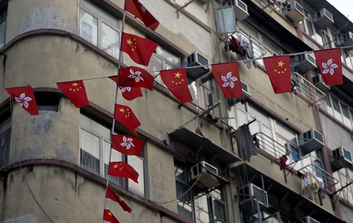Hong Kong bankers have a reputation for being politically apathetic. But 46-year-old fund manager Edward Chin--along with a number of his peers--want to buck that mold.
Agence France-Presse/Getty Images眾所周知,香港銀行家對(duì)政治不感興趣。但46歲的基金經(jīng)理陳健民(Edward Chin)和一些同行希望打破這種固定模式。
In a letter to Chinese President Xi Jinping published Wednesday, Mr. Chin along with 70 peers from the financial industry said they have concerns over Hong Kong's political, economic and social development. In particular, they said an influx of cash from China and political cronyism into the former British colony could undermine fairness in the territory's banking sector.
在周三發(fā)表的致中國(guó)國(guó)家主席習(xí)近平的一封公開信中,陳健民和金融業(yè)的70位同行表示,他們對(duì)香港的政治、經(jīng)濟(jì)和社會(huì)發(fā)展感到擔(dān)憂。尤其值得一提的是,他們表示,來自內(nèi)地的大量資金和政治上的任人唯親可能有損香港銀行業(yè)的公平性。

'Hong Kong's existing political system has become the stumbling block to the city's long-term social, political and economic growth, and is the root cause of social division and disharmony in Hong Kong,' the group said in the letter, which was published in the Financial Times and local Chinese-language paper Apple Daily.
這些銀行家在信中表示,香港現(xiàn)時(shí)的政制已成為了香港長(zhǎng)遠(yuǎn)發(fā)展的絆腳石,亦是分化社會(huì)、妨礙和諧的禍根。這封信刊登在《金融時(shí)報(bào)》(Financial Times)和香港當(dāng)?shù)刂形膱?bào)紙《蘋果日?qǐng)?bào)》(Apple Daily)上。
The criticism from the group comes ahead of a planned a civil disobedience protest movement in coming months dubbed 'Occupy Central.' The goal of the movement is to demand full universal suffrage for Hong Kong's leaders starting in 2017, free from intervention by Beijing. At the moment, Hong Kong's chief executive is currently chosen by a 1,200-member committee comprised largely of pro-Beijing and business camps.
這些銀行家提出批評(píng)之際,恰逢香港一些人士計(jì)劃未來幾個(gè)月舉行被稱為“占領(lǐng)中環(huán)”的非暴力不合作抗議運(yùn)動(dòng)。“占領(lǐng)中環(huán)”運(yùn)動(dòng)的目的是要求香港從2017年起實(shí)現(xiàn)全面普選,選舉不受北京的干預(yù)。目前,香港特區(qū)行政長(zhǎng)官由一個(gè)1,200人組成的委員會(huì)選出,委員會(huì)成員多為親北京人士和商業(yè)人士。
Mr. Chin's group urged Beijing to 'allow Hong Kong to continue to operate under a fair, just and open business environment.' It also stressed the need to 'prevent monopoly by persons or organizations of special privilege in various industries.'
銀行家們敦促北京允許香港繼續(xù)在一個(gè)公平、公正、開放的商業(yè)環(huán)境中運(yùn)行。信中還強(qiáng)調(diào)有必要防止特權(quán)人士壟斷各行各業(yè)。
A Hong Kong government spokesman did not immediately comment on the concerns Mr. Chin's group raised.
香港政府發(fā)言人沒有立即就這些銀行家表達(dá)的擔(dān)憂置評(píng)。
Hong Kong returned to Chinese control in 1997, and since then has continued to maintain its own legal and administrative autonomy. However, fears are rife that such a 'one country, two systems' arrangement is increasingly under pressure, given China's rising political and economic influence.
香港1997年回歸中國(guó),之后一直維持法律和行政自治。不過,鑒于中國(guó)大陸的政治和經(jīng)濟(jì)影響力不斷擴(kuò)大,外界擔(dān)心這種“一個(gè)國(guó)家,兩種制度”的安排將面臨越來越大的壓力。
In an interview, Mr. Chin said about one-fifth of his peers in the financial industry are Chinese Communist Party members. According to Mr. Chin, such party members enjoy advantages in raising funds and setting up private equity firms in Hong Kong. 'Yet the source of their funds as well as the way they channel the money to Hong Kong are rather fishy and questionable,' he said.
陳健民在接受采訪時(shí)稱,他的金融業(yè)同行中有大約五分之一是中國(guó)共產(chǎn)黨黨員。他說,黨員在香港籌資和成立私募股權(quán)投資基金方面享受優(yōu)待,但他們資金的來源以及他們向香港輸送資金的渠道十分可疑。
'I don't want to see Hong Kong to become the base of money laundering for mainland China,' said Mr. Chin, who has worked in the financial services sector for over two decades and runs a firm that manages various funds and works with investment banks and securities firms.
陳健民說,不希望看到香港成為大陸洗錢的基地。他已經(jīng)在金融服務(wù)業(yè)從業(yè)逾20年,經(jīng)營(yíng)著一家管理各類資金的公司,與投資銀行和證券公司進(jìn)行合作。
Joseph Cheng, a local political analyst, said many Chinese officials have been moving the money from the mainland to Hong Kong. 'This kind of money flow is not so healthy for the city,' he said, as such money might 'drive up asset prices and inflation and weigh on the livelihood of the general public.'
香港政治分析師鄭宇碩(Joseph Cheng)表示,很多中國(guó)官員把資金從中國(guó)大陸轉(zhuǎn)移到香港。他說,這種資金流動(dòng)對(duì)香港而言不是很健康,因?yàn)榇祟愘Y金將推高資產(chǎn)價(jià)格和通貨膨脹率,拖累當(dāng)?shù)毓姷纳钏健?/div>
Though he has been politically apathetic for decades, Mr. Chin said he was inspired to think about Hong Kong's future and take action after recently adopting a six-month-old boy.
盡管數(shù)十年來一直不問政治,陳健民表示,最近收養(yǎng)了一個(gè)6個(gè)月大的男孩后,他開始考慮香港的未來并采取行動(dòng)。
'What will I leave to my next generation?' he said, adding that he was worried the Chinese reliance on guanxi in doing business might diminish Hong Kong's reputation for fair competition. 'I would have regrets if I didn't speak out now,' he said.
他說:“我能給下一代留下什么?”他擔(dān)心中國(guó)商業(yè)活動(dòng)中對(duì)關(guān)系的依賴可能削弱香港公平競(jìng)爭(zhēng)的聲譽(yù)。他說:“如果現(xiàn)在不說出來,我會(huì)后悔的。”












